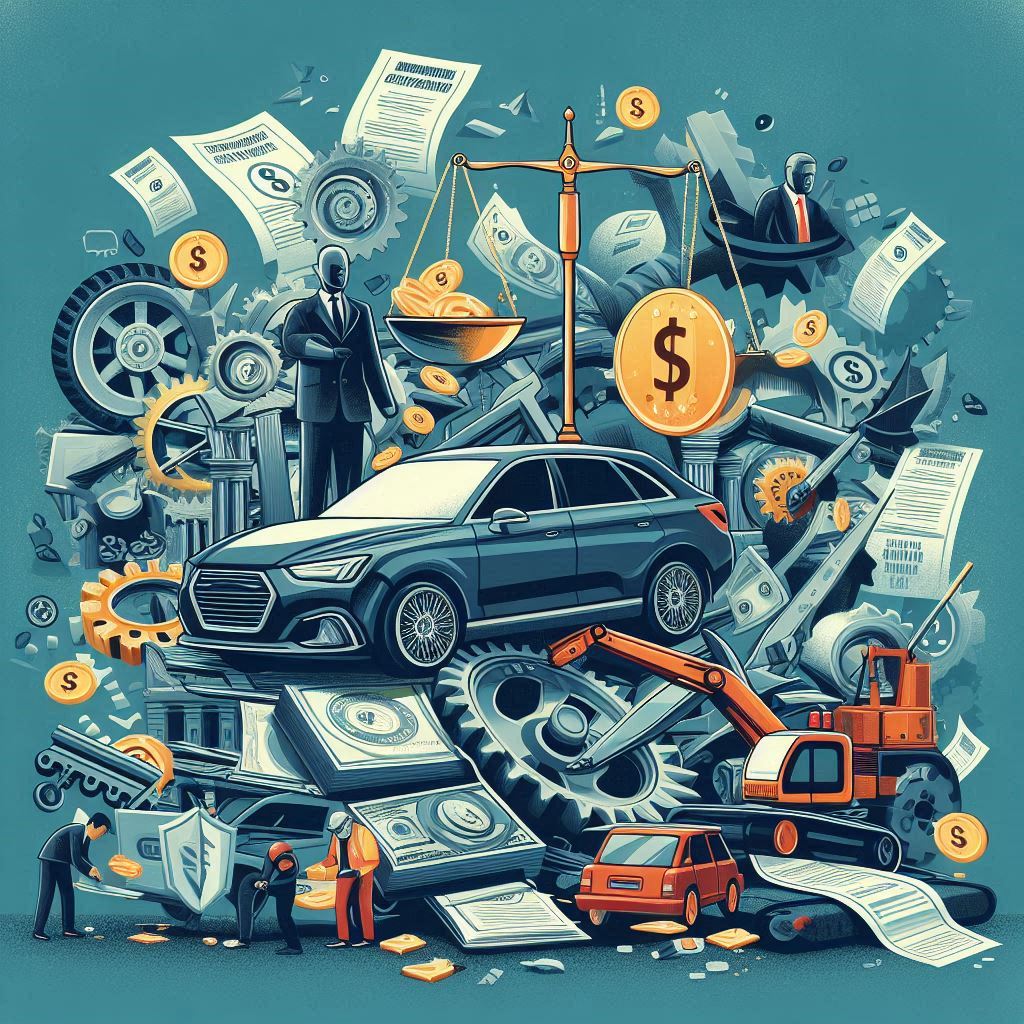When you’re involved in a car accident, the aftermath can feel overwhelming. You might find yourself asking, “How much will this cost me?” or “What is the process to receive compensation?” Whether you’re facing medical bills, property damage, or emotional distress, understanding the settlement process can make all the difference.
Navigating the intricacies of a settlement from the initial demand letter to the final payouts can feel daunting, especially when factors like driver negligence and varying state laws, such as those in Indiana, come into play. How much you receive, and how long it takes, depends on several crucial factors.
This guide will break down the essential steps and key influences, helping you understand not only the timeline but also how to maximize your settlement and minimize your financial burden. Let’s dive in, and arm you with the knowledge to approach this situation with confidence.
Factors That Influence Car Accident Settlements
When it comes to determining how much you’ll receive after a car accident, several key factors come into play. While you might want a quick settlement, it’s crucial to understand what influences the final amount. Let’s break down the most important elements that affect your settlement so you can get a clearer picture of what to expect.
1. Severity of Injuries
The more severe the injuries, the higher the potential payouts. If you’ve experienced long-term physical damage, rehabilitation, or permanent disability, this will significantly increase the compensation. But how do insurance companies calculate these damages?
Consider:
- Medical costs: Hospital visits, surgeries, physical therapy
- Future medical expenses: Ongoing treatment or therapy
- Emotional and mental impact: Not only are there physical impacts, but the accident may have long-term emotional repercussions as well
2. Driver Negligence
Negligence is a major factor in any settlement process. Was the other driver entirely at fault, or is the responsibility shared? Proving driver negligence can significantly increase your settlement, especially in cases where the negligence is clear, such as in a fatal accident or one involving DUI.
Key questions:
- Was the other driver distracted or speeding?
- Were any traffic laws violated?
- How clear is the evidence?
3. Property Damage Costs
Beyond personal injuries, the damage to your vehicle plays a role. If your car was severely damaged or totaled in the car crash, the settlement will need to cover repairs or replacement.
What influences property damage costs?
- The make and model of your vehicle
- The extent of damage (Is it a fender bender or a totaled vehicle?)
- Additional costs like towing or rental vehicles while repairs are being made
4. Insurance Coverage Limits
One of the most limiting factors in any settlement is the insurance coverage available. If the at-fault driver’s insurance has low limits, you may not receive full compensation, especially if the damages exceed their policy. This is where having underinsured or uninsured motorist coverage can help bridge the gap.
5. State Laws
Different states, like Indiana, have their own rules about car accident settlements. Some states operate under “no-fault” systems, while others are fault-based. Understanding these local laws can have a huge impact on how much compensation you’ll receive.
- Fault-based systems: The party at fault is responsible for the damages.
- No-fault systems: Each driver’s own insurance covers damages, regardless of fault.

Typical Ranges for Car Accident Settlements
Wondering how much most car accident settlements are worth? The truth is, there isn’t a one-size-fits-all answer. Settlement amounts vary significantly depending on the severity of the accident, the extent of injuries, and a few other factors. Let’s explore what you can typically expect based on different types of accidents.
1. Minor Accidents (Non-Fatal)
For minor accidents, such as a fender bender or cases involving whiplash, settlement amounts are generally lower. These are the types of accidents that result in minimal vehicle damage and no severe physical injuries. However, even in these situations, you should be compensated for any medical bills and the inconvenience of repairs.
Typical settlement range:
- $3,000 to $15,000 depending on factors like medical treatment and property damage.
2. Moderate Accidents (Involving Significant Injuries)
In cases where injuries are more severe—such as broken bones, extended hospital stays, or months of physical therapy—settlements tend to be higher. If you’ve experienced ongoing physical impact or mental impact due to the accident, the payout will reflect these long-term effects.
Consider:
- Medical expenses: Hospital visits, surgeries, rehabilitation
- Loss of income: Missed workdays or reduced earning capacity
- Emotional impact: Mental and emotional distress caused by the accident
Typical settlement range:
- $15,000 to $75,000 depending on the length and complexity of recovery.
3. Severe Accidents (Disabilities or Fatalities)
In the unfortunate case of a fatal accident or an accident resulting in permanent disability, settlement amounts can be significantly higher. Compensation in these situations not only includes current medical bills and financial impact but also long-term costs like ongoing care or lost earning potential. If the accident involved clear driver negligence, the settlement could increase even further.
Key factors include:
- Life-altering injuries: Paralysis, loss of mobility, or other permanent disabilities
- Ongoing care costs: Future medical expenses, rehabilitation, and home modifications
- Fatalities: Wrongful death settlements often provide compensation for funeral expenses and loss of companionship
Typical settlement range:
- $75,000 to several million dollars, especially in cases involving catastrophic injuries or fatalities.
Medical Expenses and Their Impact on Settlement Amounts
Medical expenses often make up the largest portion of a car accident settlement, and for good reason. Whether your injuries are minor or severe, the cost of treatment can quickly add up. From emergency room visits to long-term care, understanding how these expenses influence your settlement is crucial. But how exactly do these costs break down, and what should you be looking for?
1. Immediate Medical Costs
After a car crash, your first concern is probably getting medical attention. These immediate medical costs play a significant role in the settlement amount. Whether it’s a trip to the emergency room, surgery, or initial consultations, these are considered “economic damages” and can be easily quantified.
Common expenses include:
- Emergency room visits: Usually the first step after an accident.
- Surgical procedures: In cases of serious injury, surgery might be required.
- Hospital stays: The length of your hospital stay can directly impact your compensation.
Each of these costs is factored into the settlement process to ensure you are fully reimbursed for any out-of-pocket expenses.
2. Long-Term Medical Costs
Not all injuries heal quickly, and in some cases, the recovery process is ongoing. Settlements for moderate to severe accidents often include compensation for long-term medical costs such as rehabilitation or physical therapy. If you require continuous treatment, your settlement should reflect these future expenses.
Consider the following:
- Rehabilitation services: Ongoing therapy, whether physical, occupational, or speech therapy.
- Medication and medical equipment: Prescription drugs, wheelchairs, or crutches.
- Follow-up visits: Regular check-ups with doctors or specialists.
These long-term expenses can create a financial burden if not properly accounted for in your settlement, so be sure to document every aspect of your recovery.
3. Pain and Suffering Compensation
Beyond the tangible medical bills, there’s the more subjective issue of pain and suffering. Accidents don’t just affect you physically—they can have lasting emotional impacts as well. Whether it’s chronic pain or the anxiety and stress associated with the accident, this aspect of your recovery is equally important.
How is pain and suffering calculated?
- Physical pain: Ongoing discomfort or chronic issues resulting from the accident.
- Emotional and mental impact: Anxiety, PTSD, or depression caused by the trauma of the crash.
Unlike economic damages, this aspect is more challenging to calculate but still plays a large role in payouts.
4. Impact of Delayed Medical Treatment
Did you wait to seek medical attention after the accident? Delayed treatment can not only affect your health but also reduce the value of your settlement. Insurance companies may argue that if you didn’t seek immediate care, your injuries aren’t as severe as claimed. It’s always a good idea to get checked out right after an accident—even if you feel fine initially.

The Role of Legal Representation in Car Accident Settlements
When you’re dealing with the aftermath of a car accident, it’s easy to feel overwhelmed. Between handling medical bills, insurance claims, and potential emotional impacts, you might wonder, “Do I really need a lawyer?” While some might choose to navigate the settlement process alone, having an experienced auto accident lawyer can make a significant difference in the outcome of your case. Let’s explore why legal representation is essential and how it can affect your final settlement.
1. Negotiating with Insurance Companies
Dealing with insurance companies can be tricky. Their goal is to settle claims for as little as possible, and without proper representation, you might find yourself agreeing to a lower offer than you deserve. An auto accident lawyer knows how to counter lowball offers and fight for a fair settlement that reflects the true extent of your damages.
Here’s how a lawyer can help:
- Understand the fine print: Insurance policies can be complex. A lawyer helps you navigate confusing clauses that might limit your compensation.
- Negotiate skillfully: With legal expertise on your side, you have someone who knows the value of your claim and won’t settle for less.
2. When to Hire a Lawyer
While not every car crash requires legal representation, there are certain situations where hiring a lawyer is a smart move. If your accident involves severe injuries, driver negligence, or if the insurance company is refusing to pay, an attorney can be invaluable.
Ask yourself:
- Is the other driver clearly at fault due to negligence?
- Are my medical bills and financial impact more than I can afford?
- Has the insurance company denied or delayed my claim?
In these cases, a lawyer can advocate on your behalf, ensuring you’re not left bearing the brunt of the costs.
3. How a Lawyer Can Affect Settlement Value
One of the biggest reasons to hire a lawyer is their ability to increase your settlement value. Studies have shown that individuals who work with an attorney tend to receive higher payouts than those who go it alone. This is because lawyers understand what damages you’re entitled to and how to document them properly, from physical impact to mental impact.
With an attorney, you can secure compensation for:
- Medical expenses: Current and future medical care
- Lost wages: Compensation for time missed from work
- Pain and suffering: Including emotional trauma and physical pain
4. Average Attorney Fees and Their Impact on Final Settlement
You may be concerned about the cost of hiring an attorney. Most auto accident lawyers work on a contingency fee basis, meaning they only get paid if you win your case. Their fee is typically a percentage of your final settlement, so there’s no upfront cost to worry about.
What does this mean for you?
- No win, no fee: If your lawyer doesn’t win your case, you don’t owe them anything.
- Higher settlements: Even after paying attorney fees, you’ll likely receive a higher settlement than if you had negotiated on your own.
Steps to Maximize Your Car Accident Settlement
If you’ve been involved in a car accident, you’re likely wondering how to ensure you get the compensation you deserve. While hiring an auto accident lawyer can significantly help, there are several proactive steps you can take on your own to maximize your settlement amount. Let’s explore these actionable strategies to empower you throughout the settlement process.
1. Document Everything
From the moment the accident occurs, documentation is key. The more information you have, the stronger your case will be. This includes:
- Photos of the scene: Capture vehicle damage, road conditions, and any visible injuries.
- Witness statements: Get contact information and accounts from anyone who saw the accident.
- Police reports: Obtain a copy of the police report, as it provides an official record of the incident.
The more thorough your documentation, the easier it will be to establish liability and calculate damages.
2. Keep Detailed Medical Records
Medical documentation is crucial in proving the extent of your injuries. Be sure to keep:
- Receipts for all medical expenses: This includes hospital bills, prescriptions, and therapy sessions.
- A record of symptoms and treatments: Document any changes in your health over time, noting how your injuries affect your daily life.
Having a clear medical record helps demonstrate the financial impact of your injuries and supports claims for pain and suffering.
3. Don’t Rush to Settle
It can be tempting to accept the first settlement offer, especially if you’re facing mounting bills. However, rushing could mean leaving money on the table. Insurance companies often make low initial offers, hoping to settle quickly before you fully understand the implications of your injuries.
- Give yourself time: Evaluate the full extent of your medical treatment and recovery before agreeing to any settlement.
- Consult with your lawyer: If you decide to work with an auto accident lawyer, seek their advice on whether an offer is fair.
4. Understand the Value of Pain and Suffering
Don’t forget to factor in pain and suffering when considering your settlement. This aspect includes:
- Emotional distress: Anxiety, depression, or PTSD that resulted from the accident.
- Loss of enjoyment of life: Activities you can no longer participate in due to your injuries.
By articulating how your injuries affect your daily life, you can justify a higher settlement amount.
5. Be Prepared for Negotiations
Negotiating a settlement can be daunting, but it’s essential to advocate for yourself. Here are some tips:
- Know your worth: Research similar cases in your area to understand typical settlement ranges.
- Practice your negotiation skills: Role-play potential conversations with a friend or family member to build confidence.
- Stay calm and assertive: Approach negotiations professionally, sticking to the facts and focusing on your documentation.
Conclusion
Navigating the aftermath of a car accident can be overwhelming, but understanding the settlement process empowers you to take control of your situation. From documenting every detail of the accident to recognizing the long-term impacts of your injuries, each step you take can significantly influence the outcome of your claim.
Have you considered the financial burden that medical expenses can impose? By keeping thorough medical records and not rushing into a settlement, you can advocate for the compensation you truly deserve. Remember, auto accident lawyers are there to support you, but equipping yourself with knowledge can make all the difference in negotiations.
As you move forward, keep in mind the importance of both physical and emotional well-being. Each component—from medical expenses to pain and suffering—contributes to a comprehensive understanding of your case. Have you thought about how your experiences have shaped your view on the justice system? Your voice matters in this process.
In conclusion, while the road to recovery may feel daunting, you don’t have to walk it alone. Embrace the steps outlined in this guide, and remember that every detail counts. By taking informed actions, you can maximize your settlement payouts and ensure that you’re adequately compensated for your journey ahead. Whether you choose to negotiate on your own or seek legal assistance, be confident in your ability to secure a brighter future after a car accident.
You can also read the Unveiling the Origins of Central Banking blog and you can watch the videos on the above topics



